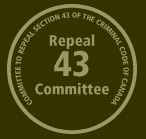![]()
Canadian Court: Spanking Kids OK
CBS News, U.S. Associated Press, Jan. 30, 2004
OTTAWA-Government lawyers said parents need some leeway in raising their children and should not be threatened with criminal charges unless discipline crosses the line to abuse.
(AP) Canadian parents and teachers can still spank naughty children, the country's highest court ruled Friday.
In a 6-3 judgment, Canada's Supreme Court rejected claims that a so-called spanking law, first enacted more than a century ago, should be struck down as a violation of children's rights.
Friday's ruling offered guidance, however, to help lower-court judges draw the line between acceptable force and abuse.
The court indicated, for example, that it would not be reasonable to use corporal punishment for children under age two or for teenagers. Nor would it be reasonable to use implements like rulers or belts, or to strike a child on the face or head.
The general rule, set out by Chief Justice Beverley McLachlin, is that corporal punishment should be legally acceptable but must involve only "minor corrective force of a transitory and trifling nature."
At issue was a section of federal law that has been on the books in one form or other since 1892. It said parents, teachers and other caregivers cannot be found guilty of assault for physically correcting a child " as long as the force used is "reasonable in the circumstances."
The law was challenged by the Canadian Foundation for Children, Youth and the Law, a Toronto-based children's advocacy group.
The foundation denounced the section as discriminatory, an infringement of children's rights and a legal endorsement of cruel and unusual punishment.
Joining in the anti-spanking campaign were the Ontario Association of Children's Aid Societies, the Child Welfare League of Canada and other children's rights groups.
The federal Justice Department defended the law but argued it should be read as allowing only "mild to moderate" force.
Government lawyers said parents need some leeway in raising their children and should not be threatened with criminal charges unless discipline crosses the line to abuse.
Backing the federal position were the Coalition for Family Autonomy, a collection of conservative lobby groups, and the Canadian Teachers Federation.
The teachers said they didn't favor corporal punishment, but feared that if the law was overturned they could face charges for physically restraining an unruly student.
The Associated Press. All Rights Reserved.







